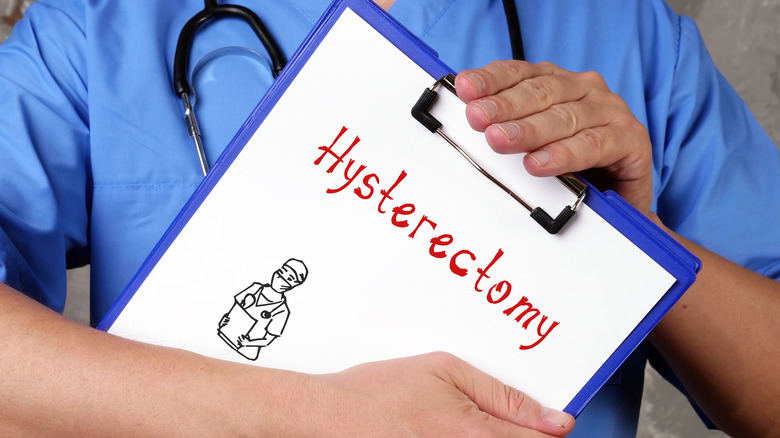How To Talk To Your Doctor About Getting A Hysterectomy
According to the National Institutes of Health, approximately one in nine women will undergo a hysterectomy in her lifetime. A hysterectomy is an operation in which the uterus is removed, sometimes along with other parts of the reproductive system, according to Stanford Health Care. There are different types of surgical procedures available, as well as different types of hysterectomies that you can have, depending on the nature of the condition prompting the surgery. Some common reasons for a hysterectomy include cancers of the reproductive organs (ovaries, uterus, cervix, or fallopian tubes), fibroids, heavy periods, and chronic pain in the pelvic region (via National Health Service).
The most common type of hysterectomy is a total hysterectomy, where the surgeon removes the uterus and cervix (via Stanford Health Care). However, there are other types you may need to consider that involve removing one or both of your ovaries, fallopian tubes, the upper area of the vagina, or tissue surrounding the cervix. When talking with your doctor about getting a hysterectomy, you should also understand your surgical options. Depending on your particular situation, these could include: an abdominal hysterectomy, where the surgeon removes the uterus through an incision in the abdominal area; a vaginal hysterectomy, where the uterus is removed through the vaginal opening; a laparoscopic hysterectomy, which involves small incisions and is much less invasive; and a robotic hysterectomy, which is also minimally invasive and causes less post-operative discomfort.
Questions to ask your doctor
Given the various types of hysterectomies and surgical approaches, you should discuss all of your concerns with your doctor so you can fully understand your options and the various risks as you determine the best way to proceed. A guide published by the New York State Department of Health provides advice on the kinds of questions to prepare for your doctor when considering a hysterectomy. Examples include: Why do I need a hysterectomy? Will it be vaginal, abdominal or laparoscopic? Do I have other choices? What are the risks or benefits of each? Which organs will be removed? Will there be physical effects after the hysterectomy and will they be permanent? The guide also suggests that you consider getting a second opinion, as well as visit The American College of Obstetrics and Gynecologists for more information.
And be sure not to leave out any questions that make you feel uncomfortable. "Where your body and your health are concerned, there are no embarrassing questions," says Anupam "Bobby" Garg, a gynecologist and robotic surgeon at Scripps Clinic. These could include questions related to sexual activity following the procedure, whether the procedure could cause urinary problems, or if the procedure will expedite the onset of menopause, among other important concerns. "The type of hysterectomy that is best for you depends on your medical condition, your plans for a family and other individual factors," says Dr. Garg. "Discuss your concerns with your doctor, and together you will determine the approach that is best for you."


